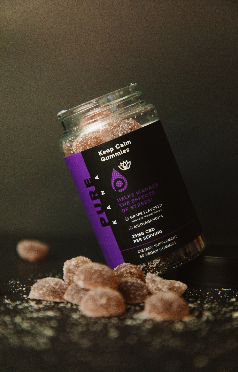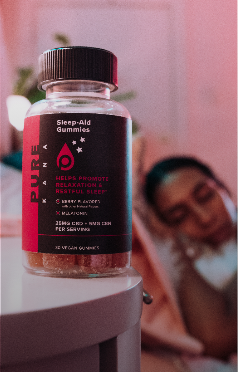The importance of sleep cannot be overstated. Good sleep improves mood, brain performance, and health, while sleep deprivation can be detrimental to health and increase the risk of certain diseases and disorders.
Experts recommend that adults sleep between 7 and 8 hours every night. Unfortunately, modern-day living doesn’t always embrace the need for adequate sleep.
According to reports, more than one-third of Americans aren’t getting enough sleep regularly. Yet there is strong evidence that lost sleep can impact overall health. Therefore, it’s time we all start taking note of the importance of sleep
There are supplements and practices that can help improve sleep. Specifically, CBD is showing a lot of promise in sleep support. We will explore more tips for improving sleep quality a little later.
First, here are the top reasons sleep is vital for health and wellness.
Better Productivity and Concentration
Sleep is linked to several brain functions, including productivity, concentration, and cognition.

It shouldn’t surprise us that sleep and productivity are closely linked. When we are sleep deprived, it’s harder to concentrate, reaction times are slower, and memory becomes impaired. All these factors affect productivity levels. Certain CBD products, like PureKana’s 1200mg capsules, are excellent for boosting productivity and concentration.
Calorie Regulation
Believe it or not, sleep can help you maintain or lose weight. There are a few reasons for this, one being that when you’re well-rested, you’re less hungry and consume fewer calories during the day.
Sleep deprivation affects leptin and ghrelin – hormones in the brain responsible for controlling appetite. When these hormones are out of balance, we find it more challenging to resist the temptation of unhealthy foods.
Furthermore, when we’re tired, we’re less motivated to get up and move, affecting our activity levels. So we’re less likely to burn calories through exercise compared to if we’re well-rested.
Preventing Depression
There is a strong link between poor sleep and mental health issues, like depression. When you’re well-rested, you don’t only have more energy, but you may also have better focus and a more positive view of life.
The deep stages of sleep recharge the system and keep the body healthy. Sleep is restorative and helps recharge us mentally and physically. As such, it plays a big role in emotional wellbeing.
Supports a Healthy Immune System
Sleep provides essential support to the immune system. While lack of sleep can impair immune function, getting enough sleep strengthens the immune system.
Sleep deprivation changes the way immune cells work. They may not attack as quickly, failing to fight germs and infections, so you may get sick more frequently. On the contrary, better sleep quality can help the body fight off infection.
Lower Weight Gain Risk
Sleep’s ability to lower the risk of weight gain is largely linked to its calorie-regulating effects.
Poor sleep can increase cortisol levels (the stress hormone) and reduce leptin levels, a hormone that controls appetite. When the body doesn’t receive sufficient sleep-wake cycle signals, it may try to compensate in other ways and seek out high-calorie foods that are higher in fat and sugar.
Sleep-deprived individuals often have a bigger appetite and consume more calories, which leads to weight gain. Therefore, by getting enough sleep, you can curb your appetite and reduce the risk of putting on weight.
Stress Reduction
Getting enough sleep is key to reducing stress. Good quality sleep calms and restores the body and improves our ability to cope with stressful situations.

Sleep deprivation can cause the body to react as though it’s in distress, releasing more of the stress hormone cortisol. Too much cortisol cause health issues and affect stress levels.
On the contrary, getting enough sleep can decrease cortisol levels and restore balance in the body. An optimally functioning body reduces feelings of stress and anxiety.
4 Tips for Better Sleep Quality
Now that we know the importance of sleep for a healthy lifestyle let’s explore how you can improve sleep quality.
1. Get Your Body Clock Back On Track
We each have an internal body clock that influences when we’re tired and when we feel awake. When our body clock is functioning normally, it sends signals to our body to sleep at night and wake in the morning.
However, various factors, such as traveling, shift work, or just a busier-than-usual schedule, can throw our sleep clock out of sync, disrupting our regular sleep schedule.
This can negatively impact sleep quality and make it difficult to sleep and wake at the right times. Therefore, it’s important to reset your body clock to get your sleep schedule back on track.
For optimal sleep, it’s important to keep the same sleep time and wake time every day. If your sleep schedule is “out of whack,” adjust your bedtime to get back into healthy habits. For instance, start going to bed 15 minutes earlier every night.
Here are a few other tips for getting your body clock back on track:
- Avoid napping because it can disrupt nighttime sleep.
- Get up at the same time every morning – resist the urge to sleep in.
- Avoid light exposure before bed.
- Be wary of what you eat before bedtime. Sugar and caffeine are stimulants, while spicy foods can cause heartburn, which may interfere with sleep.
2. Create a Relaxing Sleeping Environment
You should never underestimate the importance of your sleep environment. It can either improve sleep or be the thing that’s keeping you up tossing and turning all night.
When optimizing your sleep environment, key factors include lighting, noise, and comfort.
In general, it’s best to sleep in complete darkness. Artificial light, which includes nightlights and screen light, mimics natural light to keep you from sleep. If possible, you should eliminate all light when you climb into bed. Also, try to keep your room quiet. If external noises, like traffic or noisy neighbors, are a problem, try using a sound machine to drown out the sounds.
Additionally, make sure your bed is comfortable. If you wake up stiff, numb, or sore, it might be time for a new mattress or pillows. An uncomfortable bed causes tossing and turning and greatly impacts sleep.
Other considerations include clearing your room of clutter, which can be distracting while you’re trying to sleep, and ditching all electronics at least 30 minutes before bed.
3. Avoid Drugs
Certain drugs can interfere with sleep. Specifically, certain blood pressure, heart, and asthma drugs, as well as over-the-counter medications for headaches and allergies, can disrupt normal sleep patterns.
In fact, there are several common medications that can stop you from falling asleep or staying asleep, while others can make you sleepy or groggy during the day. Therefore, it’s important to check the medicines you are on and determine if any of them may be interfering with your sleep.
Additionally, be mindful of how alcohol and illicit drugs like cocaine can impact sleep. Although alcohol may aid with sleep onset, it disrupts your sleep cycle in the long run. In general, drugs and sleep don’t have a good relationship.
4. Natural Sleep Supplements and Vitamins
Finally, you may benefit from natural sleep aids that can improve sleep quality. Natural supplements are a great alternative to sleeping pills, which have many side effects and are often addictive.
Melatonin is perhaps the best-known natural sleep supplement. Melatonin is a hormone made in the body that helps regulate our sleep-wake cycle. However, sometimes our body doesn’t produce enough melatonin – which is often the case with insomnia. Melatonin supplements increase melatonin levels in the body and enhance sleep.
But there is another natural supplement also touted for its sleep-promoting properties; CBD. CBD can help to improve sleep by addressing issues that may be causing poor sleep, such as stress or pain. By calming the body and mind, CBD helps relax and prepare us for bed.
PureKana has an array of CBD products that may support a good night’s rest. However, there is one designed for this specific purpose; CBD + Melatonin Sleep Aid Capsules. By combining the sleep-promoting powers of melatonin and CBD, your chance of getting an adequate night’s sleep is twofold.
Summary
Sleep is an essential, often overlooked, part of every individual’s overall health and wellness. It affects many aspects of life, including productivity, mood, stress, immune health, weight, and more.
Fortunately, there are numerous ways to improve sleep quality that don’t involve taking sleeping pills. These include getting your body clock back on track, creating a relaxing sleeping environment, and using natural sleep aids.
Specifically, CBD supplements are an excellent way to support a good night’s rest. CBD is touted for its calming properties, which may be particularly beneficial for improving sleep quality. Shop PureKana’s range of CBD products here to find a CBD offering that fits effortlessly into your sleep routine.








